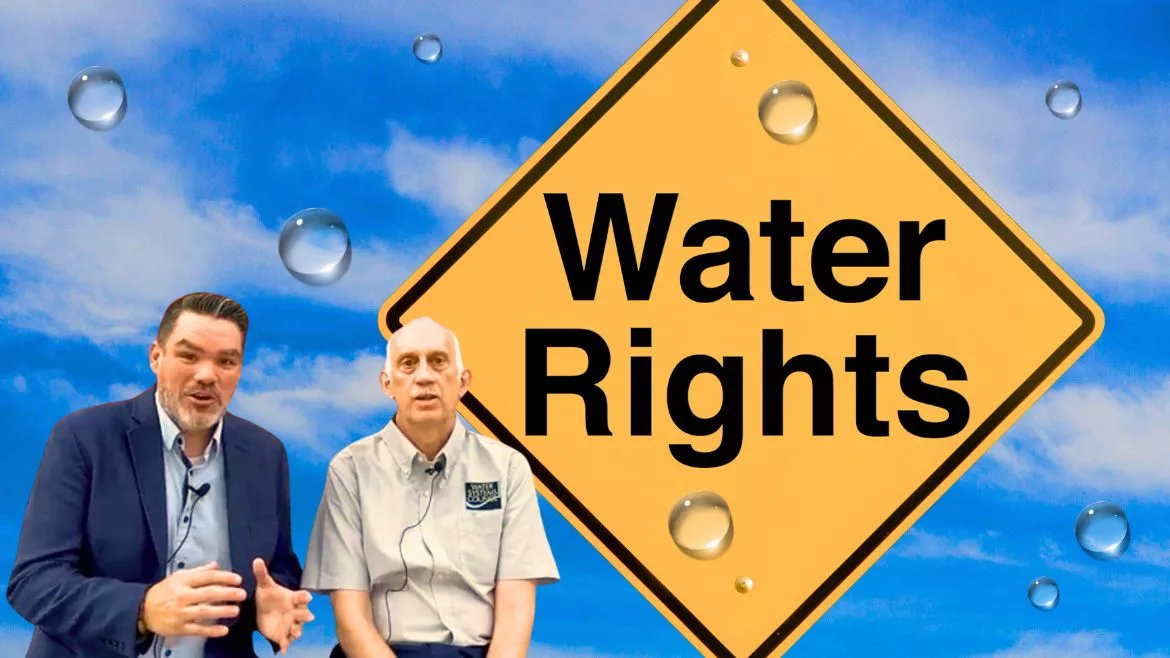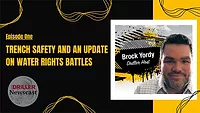Water Rights and Industry Challenges at the 2024 Jubilee: An Interview with Jesse Richardson

In this compelling interview from the 2024 South Atlantic Drilling Jubilee, Brock Yordy sits down with Jesse Richardson, a prominent legal scholar and water advocate, to delve into pressing issues affecting the water well and drilling industries. Richardson, a professor at West Virginia University College of Law and legal advisor for the Water Systems Council, shares his insights on significant legal battles, such as the Texas vs. New Mexico water rights case, and the controversial topic of mandatory hookups to public water systems.
Watch the full newscast interview!
Brock Yordy
Hi, this is Brock Yordy, live at 2024 South Atlantic Drilling Jubilee. And we’ve got our favorite legal scholar, water advocate, and Water Systems Council guru, Jesse Richardson. Jesse, introduce yourself and what you do, and then we'll get into some hot-button topics.
Jesse Richardson
I'm Jesse Richardson, a professor at West Virginia University College of Law and the legal advisor for the Water Systems Council. So, I work on water rights and water issues all across the country.
Brock Yordy
Did you think this is what you would be doing with your career right now?
Jesse Richardson
I did not. It all kind of happened by accident. I was practicing law in my hometown of Winchester, Virginia when the widow of a former law partner contacted me and had a water problem. It was a really high-visibility case, and, you know, I represented her, and it was like a set of dominoes falling, and here I am.
Brock Yordy
So now, at West Virginia University, you see a lot of young professionals getting into environmental and water science and wondering how this has picked up over the years and the importance of what we do day to day for litigation.
Jesse Richardson
It's been amazing. Water has always been a hot issue in the West, but in the East, when I had this case 30 years ago, I couldn't get anybody at the State Department of the Environment to pay attention to me. Now, a lot of young people are interested in it. States are regulating it more in the East.
Brock Yordy, Jesse Richardson
Water is much more scarce in the East than it used to be, and the demands were higher when you did that first case.
Brock Yordy
The drilling and water industries did what they always do: grab you and bring you into something. How long ago was that?
Jesse Richardson
30 years ago? So, that really ages me, then.
Brock Yordy
But if we think about it, West Virginia, you know, 30 years ago, was Parkersburg and PF. You look at what we had for water quality. You look across the country. You can Google things in the Western United States and water in California. And you can find a study from 2007 that says it looks like we have a nice, abundant amount of water for the San Joaquin Valley.
Brock Yordy, Jesse Richardson
And here we are in 2024, and yeah, there is no more abundant water.
Brock Yordy
No, climate change has changed that quite a bit. Jesse is one of a few individuals like me who end up reading every brief that comes out, and he, with his brilliance, gets to help write some of these and some responses. So, we at the Newscast have covered some of these discussions. First, I want to talk about Texas vs. New Mexico, which we talked about; what did you see out of that case?
Jesse Richardson
Well, that was, I think, a surprise for at least some people in Texas versus New Mexico, which has been going on for ten years now. And I think probably six years ago, the United States Supreme Court allowed the federal government to intervene in the case because it's odd. After all, New Mexico delivered the water not to the state line but to Elephant Butte Reservoir, which is a federal project.
And so the court said, the federal government, you can get in now. Fast forward six years. And finally, New Mexico and Texas reached an agreement, and they said we would move forward. It was kind of like all agreements. It was good for Texas because now they measured the water at the Texas line at the state line. It was good for New Mexico because they retained the groundwater pumping levels from the 1970s and 1980s instead of 1938 instead of the groundwater pumping levels from 1938, which, of course, were much lower. And so they agreed. But now the federal government said, whoa, wait a minute, we don't like this agreement and went back to the Special Master; the Special Master studied it and said, hey, we only let the United States in because they represented Texas.
Everybody agrees now. So, I think we should approve the settlement. It went up to the United States Supreme Court, and in a 5 to 4 decision, the court said, no, we can't allow this to be settled until the United States government agrees. So now we're back to square one.
Brock Yordy
It's hard because New Mexico, as one of our states in the union, is very depressed. You know, there are a lot of water issues happening there. We look at the Navajo Nation, the state of Arizona, and the Colorado River. We know for a fact that New Mexico and Texas aren't getting the water that they're supposed to out of the Colorado compact, and that's a million, a million and a half acre-feet. And this debate is over 66,000-acre feet for irrigation and citrus farmers. This isn't precisely impacting rural water, right?
Jesse Richardson
It's impacting agriculture mainly. Yeah. I mean, at the center point, you kind of alluded to this: This is all about groundwater pumping. The allegations of Texas are that New Mexico is allowing water wells to go in along the river and that it is taking water from the river that should go down to Texas.
Brock Yordy, Jesse Richardson
I would say most of these wells are probably agriculture wells, probably a few domestic wells, but it's really about agriculture, and for me, Texas is a big state.
Brock Yordy
It's got a lot of house seats, and it is a big topic to directly recognize groundwater pumping and its impact on the supply of a river. So, moving beyond that, what else is going on? Because this Chevron Doctrine now deference that was part of 40 years over 7000 cases. Can you give us a dumbed-down explanation like this: ambiguous or unambiguous? Why? Why are these agencies suddenly bringing round tables together, asking for, you know, discussions, questions, and comments? We just haven't had the laws. Whose fault is it? We're here right now.
Jesse Richardson
Oh gosh. That's a good question, and it depends on who you ask. But yeah, it's probably the most talked about case in the latest Supreme Court term. It is the case that looked at the Chevron test. We're talking about Congress passing a law, and then they delegate authority to a federal agency like the EPA, for example, to
administer that law. And, of course, Congress can't put everything into law. There are gaps, so the agency passes a regulation, and some people disagree with the regulation.
Brock Yordy
Maybe it's an industry group, perhaps it's an environmental group, maybe it's a house that wants to be on Priest Lake.
Jesse Richardson
Yes. So they challenge that regulation, and it gets to the court. And the question is, how much deference does the court give to the agency's interpretation? And 40 years ago, the United States Supreme Court said, well, here's how we're going to do it. Step one is because we always start with what Congress said. And if Congress has already spoken to it, then that is the end of the story.
But if Congress hasn't spoken to it, what do we do? Forty years ago, the court said we would defer to the agency because they were the experts. And if the agency interpretation is reasonable, it doesn't have to be the best interpretation in the court's opinion. Just if it's reasonable, then we're going to defer to it. In the Loper Bright case this past term, the court said all of that was wrong.
We shouldn't have done that. We're going to change, and now, if Congress speaks to it, we will stick with what Congress said. If they don't, then we're not going to give deference; we're going to respect whatever the agency's decision is.
Brock Yordy
So, the Loper case concerns inspectors on fishing boats. The initial Chevron Doctrine involved Chevron versus the National Resource Defense Council regarding drilling in Alaska.
Jesse Richardson
It was air quality.
Brock Yordy
Oh, it was air quality. How do you define a pollutant?
Jesse Richardson
Yeah. Well, it was: How do you define a stationary source? Do you just look at one smokestack, or do you look at a whole? For example, if I have a factory with five buildings, do I look at all five buildings or just one of them?
Brock Yordy
So here we are, talking about air quality. I had always assumed Chevron was involved in oil drilling. But no, now I understand the processing. We have translated that into observation or oversight of fishing.
Jesse Richardson
Yeah.
Brock Yordy
And suddenly, there are a lot of laws that Congress has to pass regarding water quality. We want them just to pass the USDA bill, the farm bill, right? That hasn't been passed since 2018. And now we're saying, hey, by the way, with all the rest of the things happening in the country right now, do you have time to make these laws?
Jesse Richardson
Yeah. And you asked it first, who's to blame for this one view that you could take was, well, if Congress speaks to it, we're not sitting here right now. But the odds of Congress passing something comprehensive right now are pretty slim.
Brock Yordy
I think there's just a lot happening, and there's a lot of inner workings. So, if I dumb this down, I'm throwing a curveball at you. Epa Nixon starts the EPA after we send astronauts into space, preparing for this moon mission. We can see an environmental impact on water and air quality. And then we have the Cuyahoga River caught on fire.
And suddenly, we say there needs to be an environmental protection agency. How do we know where the balance is? If every rule put together is based on this idea, it is no different than OSHA. Our regulatory agencies bring in round tables. They ask for comments. It's a 9—to 18-month process to come up with a rule. It's not like the agency said no, but this is what will happen.
The fishing oversight came from calls for comments. How do we get here? I don't understand how we can't have an agency trying to help us. So, obviously, there's some steering that needs to be done, and that agency is appointed by the president and the cabinet, right?
Jesse Richardson
Well, it depends. EPA is a little different, but a lot of times, Congress will create an agency in the statute, and that's the issue. The constitution sets out our three branches of government: the executive, the legislative, and the judicial agencies are just this made-up thing that tries to help out. And so when Congress passes a law, they can't do everything. So they say we will delegate this to this agency that we created to implement the law, and that agency is a creature of Congress. And so if Congress doesn't give them any authority, they don't have it. And that's where we are. It's like Congress gave you some authority agency. But how much did they give you the authority to define waters in the United States, including isolated water bodies? And so you look at the legislation and see if they did or didn't.
Brock Yordy
Yeah. And then the argument is a mud puddle, which is what our Supreme Court justice said, right? Like a mud puddle is not the same as, you know, a wetland as the same as the navigable water. And so the last piece I want to jump into, you've been down here, and there are a lot of things going on.
Last year. We celebrated this idea that Georgia passed laws on the idea laws, and everybody, not an agency, came in that if you have an acre or more of land, you can have private water. Well, how has that been going for the rest of the state? The success?
Jesse Richardson
Lately, we've had a lot of mandatory hookup issues. A lot of local governments and even states at this point are trying to force homeowners to connect to public water, and they might use it as the vehicle for that to say, oh, we've got PFAS contamination. That means you must hook the public water, or they might try another angle. And even I'll tell you a little anecdote about Georgia.
Brock Yordy, Jesse Richardson
Some local governments in Georgia are basically ignoring that state statute and still trying to require a mandatory connection. I worked in municipal water and saw rural water systems a few years ago, in 2022, when Governor Newsom was in California. Mind you, we're on the east coast of the Atlantic.
Brock Yordy
Jubilee said we need to cut our water by 10%. And then they returned a couple of months later and said we can do it again. We're going to be in a really good place. California needed to cut 3 million acre-feet. They're trying to capture a million and a half stormwater acre-feet. They have funding for this. Then they returned a third time and said, we need to do it. And the municipality said, if you cut us again, we no longer have an operating budget.
So, for a rural system to say we need mandatory hookups, it's about maintaining the system-wide network. But simultaneously, as we've discussed PFAS, the municipal system isn't testing for PFS. Now, we're saying, test the private water well for PFAS, and if you have it, you need to hook it up.
Jesse Richardson
Yeah. In most of these cases, if private water wells have PO, so does the public system. Like you said, it's all about generating enough revenue to keep that system going.
Brock Yordy
The important thing—and this is what's great about having Jesse here, and then we'll see him again at NGW A—is our state associations with working with the Water System Council and the National Groundwater Association; all of us are better together. When we can have a legal scholar into these things, it's very important, and Jesse is here to help and reach out to the Water System Council.
But as we hear these things, we have the power to advocate and the state of Georgia did it unanimously bipartisan was able to pass this law and continue to pass more. So, any last thoughts?
Jesse Richardson
Well, I want to follow up on that. I was at the North Carolina Groundwater Association meeting just a little while ago, and their executive director echoed what Margaret Martin, the Executive Director of the Water Systems Council, has been saying repeatedly. We've been preaching to the choir that the vital cog in this is the state associations. We need strong state associations to protect the water well industry.
And luckily, we have some, but we need more; we need them to be strong. It's tough, though. We're talking about full-time water well contractors who, in their spare time, if they have any, are volunteering to do this work for the industry, but they are our eyes and ears in the field, and if it weren't for them, I wouldn't even know what's happening out there. So we do whatever we can to keep those state associations strong and keep them going.
Brock Yordy
It's, I think, the most significant piece, and this is what's incredible about the Water System Council—our state association. About 11% of our voting population has a private water well, with around 14 million water wells. So, in reality, you got 89% of the voting population that just turns a faucet on and only knows about a water bill and being able to have an excellent, competent contractor that comes in and constructs a water well to the best practices and regulations possible that homeowner has a water, well, that's their responsibility but is isolated from any other situation. And that's what we want to get back to.
There is a huge possibility right now in our industry to see an increase in water wells, not a decrease, but it will return to education. It's gonna come back to understanding mandatory hookups or understanding the impact of PFAS or GenX chemicals or these other pieces. And that's where we got to reach out to our state associations back to Margaret and Jesse, back to the NGWA, the partner states of the Jubilee coming together mid-year, really puts us in a good spot going into December and then thinking about what our 2025 looks like.
Still, we talked about these things in December; November 5th has already passed, everybody. So right now, what we're discussing and thinking about is more important than ever, and it concerns who best represents groundwater for us.
Jesse Richardson
Yeah, definitely. Thank you, Brock.
Brock Yordy
Appreciate it. Thanks, Jesse.
Looking for a reprint of this article?
From high-res PDFs to custom plaques, order your copy today!





